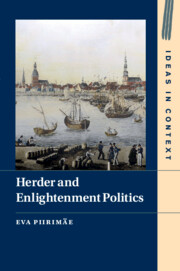Book contents
- Herder and Enlightenment Politics
- Ideas in Context
- Herder and Enlightenment Politics
- Copyright page
- Contents
- Preface
- Acknowledgements
- Note on Translations
- Abbreviations
- Introduction
- Chapter 1 Republics, Monarchies and the Philosophy of Human Society
- Chapter 2 Rousseau and the Origins of the ‘Current Malaise of the World’
- Chapter 3 Montesquieu’s System and Reforms in Russia
- Chapter 4 The Bildung of Humanity and Modern Virtue
- Chapter 5 German Freedom and Modern Liberty
- Chapter 6 The Vocation of Poets, Pastors and Philosophers
- Chapter 7 State-Machines, Commerce and the Progress of Humanität in Europe
- Chapter 8 Perpetual Peace and Purified Patriotism
- Conclusion
- Epilogue
- Bibliography
- Index
Chapter 6 - The Vocation of Poets, Pastors and Philosophers
Published online by Cambridge University Press: 30 March 2023
- Herder and Enlightenment Politics
- Ideas in Context
- Herder and Enlightenment Politics
- Copyright page
- Contents
- Preface
- Acknowledgements
- Note on Translations
- Abbreviations
- Introduction
- Chapter 1 Republics, Monarchies and the Philosophy of Human Society
- Chapter 2 Rousseau and the Origins of the ‘Current Malaise of the World’
- Chapter 3 Montesquieu’s System and Reforms in Russia
- Chapter 4 The Bildung of Humanity and Modern Virtue
- Chapter 5 German Freedom and Modern Liberty
- Chapter 6 The Vocation of Poets, Pastors and Philosophers
- Chapter 7 State-Machines, Commerce and the Progress of Humanität in Europe
- Chapter 8 Perpetual Peace and Purified Patriotism
- Conclusion
- Epilogue
- Bibliography
- Index
Summary
In the 1770s, Herder engaged with early forms of poetry and religion, highlighting the moral and political role of poets and priests in ancient Israel and ancient Germany (Saxony) as well as analysing the political systems of these societies as models of ‘unity in multiplicity’. He simultaneously also explored the historical development of ‘northern’ traditions, maintaining that they initially constituted a ‘wonderful mixture’ between Christianity and national poetry. His key idea was that the revival of Greek and Roman models of poetry in the early modern period had created a wedge between religion and poetry as well as the culture of the elites and the people, which in turn contributed to solidifying mechanical forms of government. However, modern historical consciousness—as exemplified in Shakespeare— had an enormous moral and political potential. Modern cultural leaders could cultivate new reflective forms of art and philosophy that would enhance the human capacity for self-determination as well as genuine sociability. This ethic would be fully in line with Christian morality, whilst also enhancing the status of their particular cultural and political community in international contexts. Herder proposed that a ʻpatriotic institute for Germany’s universal spirit’ could serve as centre of such a reform movement.
- Type
- Chapter
- Information
- Herder and Enlightenment Politics , pp. 204 - 229Publisher: Cambridge University PressPrint publication year: 2023

